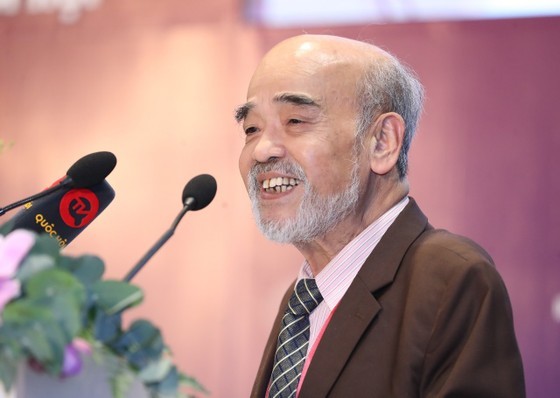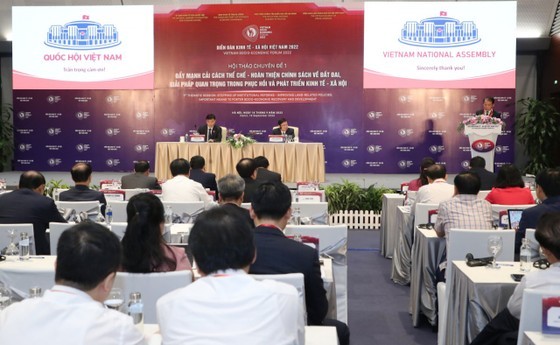 Prof.-Dr. Dang Hung Vo, former Deputy Minister of Natural Resources and Environment, speaks at the thematic discussion. (Photo: SGGP)
Prof.-Dr. Dang Hung Vo, former Deputy Minister of Natural Resources and Environment, speaks at the thematic discussion. (Photo: SGGP)
At the thematic discussion session on ‘Promoting institutional reform - Perfecting land policy, important solutions in socio-economic recovery and development’ within the framework of the Vietnam Socio-Economic Forum 2022, Prof.-Dr. Dang Hung Vo, former Deputy Minister of Natural Resources and Environment, said that the process of accessing land for enterprises to implement investment projects is one of the most important issues to be concerned with at present.
“Because these projects generate profits, people whose land has been recovered often compare the profits of project investors after receiving allocated or leased land with their profits in compensation and support when their land is acquired. This is the main reason leading to the situation that people's complaints about land always account for a high percentage of the total civil complaints," said Prof.-Dr. Dang Hung Vo.
In fact, the land price list of the State set by the provinces is only equal to 30-60 percent of the land market value. The fact that the regulations on the State mechanism for land acquisition are not of a market nature is the main cause of frustration when land is acquired.
Based on a specific analysis of the compulsory land transfer mechanism and the voluntary land transfer mechanism, the neutral mechanism takes advantage of the strengths and overcomes the weaknesses of both compulsory and voluntary mechanisms. It is called social consensus land transfer. Prof.-Dr. Dang Hung Vo said that forced land transfer always leads to many complaints from people. Still, the voluntary land transfer has the disadvantage that investors can hardly fully access land for investment projects.
Supporting the social consensus mechanism, Prof.-Dr. Dang Hung Vo said that Resolution No.18-NQ/TW of the Party Central Committee required the implementation of the method of contributing land and adjusting land for urban and rural residential area embellishment and development projects. Especially, the resolution has set out the legislation of a benefit-sharing mechanism between the State, project investors, and those whose land is acquired.
“Because these projects generate profits, people whose land has been recovered often compare the profits of project investors after receiving allocated or leased land with their profits in compensation and support when their land is acquired. This is the main reason leading to the situation that people's complaints about land always account for a high percentage of the total civil complaints," said Prof.-Dr. Dang Hung Vo.
In fact, the land price list of the State set by the provinces is only equal to 30-60 percent of the land market value. The fact that the regulations on the State mechanism for land acquisition are not of a market nature is the main cause of frustration when land is acquired.
Based on a specific analysis of the compulsory land transfer mechanism and the voluntary land transfer mechanism, the neutral mechanism takes advantage of the strengths and overcomes the weaknesses of both compulsory and voluntary mechanisms. It is called social consensus land transfer. Prof.-Dr. Dang Hung Vo said that forced land transfer always leads to many complaints from people. Still, the voluntary land transfer has the disadvantage that investors can hardly fully access land for investment projects.
Supporting the social consensus mechanism, Prof.-Dr. Dang Hung Vo said that Resolution No.18-NQ/TW of the Party Central Committee required the implementation of the method of contributing land and adjusting land for urban and rural residential area embellishment and development projects. Especially, the resolution has set out the legislation of a benefit-sharing mechanism between the State, project investors, and those whose land is acquired.
 The scene of the meeting. (Photo: SGGP)
The scene of the meeting. (Photo: SGGP)
According to Prof.-Dr. Dang Hung Vo, the land finance system consists of two basic contents. First, the land price set by the State must be consistent with the market value. Second, the land use tax system must be reformed to match the income levels of workers and people, at the same time, using tax instruments to prevent land speculation, or the situation of having land but not putting it to use, leaving it abandoned. Thus, the issue of land price and land finance policies beyond tax policy will be considered and regulated in the Land Law. Meanwhile, policies on land-use tax or real estate tax (or property tax) are regulated in the Tax Law, which should be developed in sync with the Land Law. For land finance policies, to facilitate development investment, it is necessary to establish a mechanism to allow the mortgage of land-use rights at domestic and foreign credit institutions - either directly at foreign financial institutions or indirectly through domestic credit institutions acting as mortgage agents. At that time, the loan interest rate will be much lower by reducing the risk of loans, creating more favorable conditions for investment projects.
























